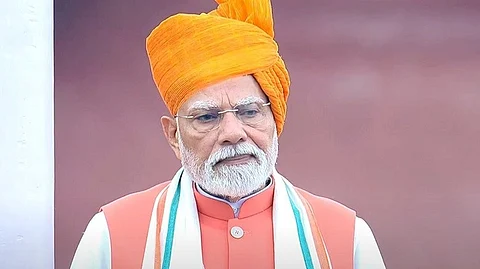

Follow TNM’s WhatsApp channel for news updates and story links.
Hailing the centenary of the Rashtriya Swayamsevak Sangh (RSS) as a “very proud and glorious” journey of the “world’s biggest NGO,” Prime Minister Narendra Modi on Friday, August 15, praised its volunteers for a century of service, discipline, and commitment to nation-building.
“A hundred years ago, an organisation was born with the resolve of ‘vyakti nirman’ [character development] and ‘rashtra nirman’ [nation building] for the welfare of ‘matrubhoomi’,” he said in his Independence Day address from the ramparts of the Red Fort, adding that the RSS’s service and dedication will “keep inspiring us.”
He also said that nation-building was not the work of the government alone but of “crores of people, including saints, seers, scientists, teachers, farmers, soldiers, labourers, individuals, and organisations.”
Earlier in the day, after hoisting the national flag at the Utkal Bipanna Sahayata Samiti in Bhubaneswar, Mohan Bhagwat said that citizens must match the dedication of freedom fighters in building a stronger, more compassionate nation. Recalling India’s struggle from 1857 through three generations of sacrifice, Bhagwat said that the essence of ‘Swaraj’, self-governance, was rooted in self-identity and awareness. He said that India’s mission was to promote peace, harmony, and dharma, and called for the country to rise as a ‘Vishwaguru’.
In New Delhi, Prime Minister Modi led the national Independence Day celebrations, hoisting the tricolour at the Red Fort in his 12th consecutive address from its ramparts. “This festival of freedom is a festival of 140 crore resolutions,” he said, calling it “a moment of pride in collective achievements” and hailing the Constitution as a guiding lighthouse since independence.
A major highlight of his speech was the tribute to the armed forces for the success of Operation Sindoor — India’s decisive military response to the April 22 Pahalgam terror attack. “Today, I got the opportunity to salute the brave soldiers of Operation Sindoor from the ramparts of the Red Fort. Our brave, valiant soldiers have given the enemies a punishment beyond their imagination,” he said.
He also said that the armed forces were given a free hand to set targets and decide timing, leading to deep strikes “hundreds of kilometres into enemy territory” that reduced the terror headquarters to “dust”. He said Pakistan’s “sleep is still disturbed” due to the scale of destruction, and warned that “India will no longer tolerate nuclear blackmail”, adding, “Blood and water will not flow together.”
His remarks were also a pointed reference to the Indus Waters Treaty, which he criticised as “unjust and unreasonable”, hinting at a potential review if Pakistan continues supporting terrorism. “Terrorists and those who shelter them will not be seen separately,” he declared.
The Red Fort ceremony included a symbolic aerial display by two Mi-17 helicopters of the Indian Air Force, one flying the tricolour, the other carrying a flag depicting Operation Sindoor, while showering petals over the venue. The ceremonial grounds bore floral motifs honouring the mission. Thousands, including dignitaries, schoolchildren, and citizens from across the nation, attended the celebrations.
PM Modi also used the occasion to unveil ‘Mission Sudarshan Chakra’, an ambitious 10-year plan to secure India’s critical establishments using indigenous technology. “Every citizen must feel protected,” he said, and added that the mission draws inspiration from Lord Krishna shielding the sun in the Mahabharata to enable Arjun’s victory. The mission will involve advanced surveillance, cyber protection and physical security, in collaboration with defence, research agencies and private innovators, aligning with the Aatmanirbhar Bharat vision.
He also said that we should build a Viksit Bharat (Developed India) by 2047, stressing that national security and inclusive development were the twin pillars of progress. He called for unity in preserving the nation’s sovereignty and dignity, telling citizens, “We cannot afford to be reactive. We must anticipate and prepare.”
(With IANS inputs)